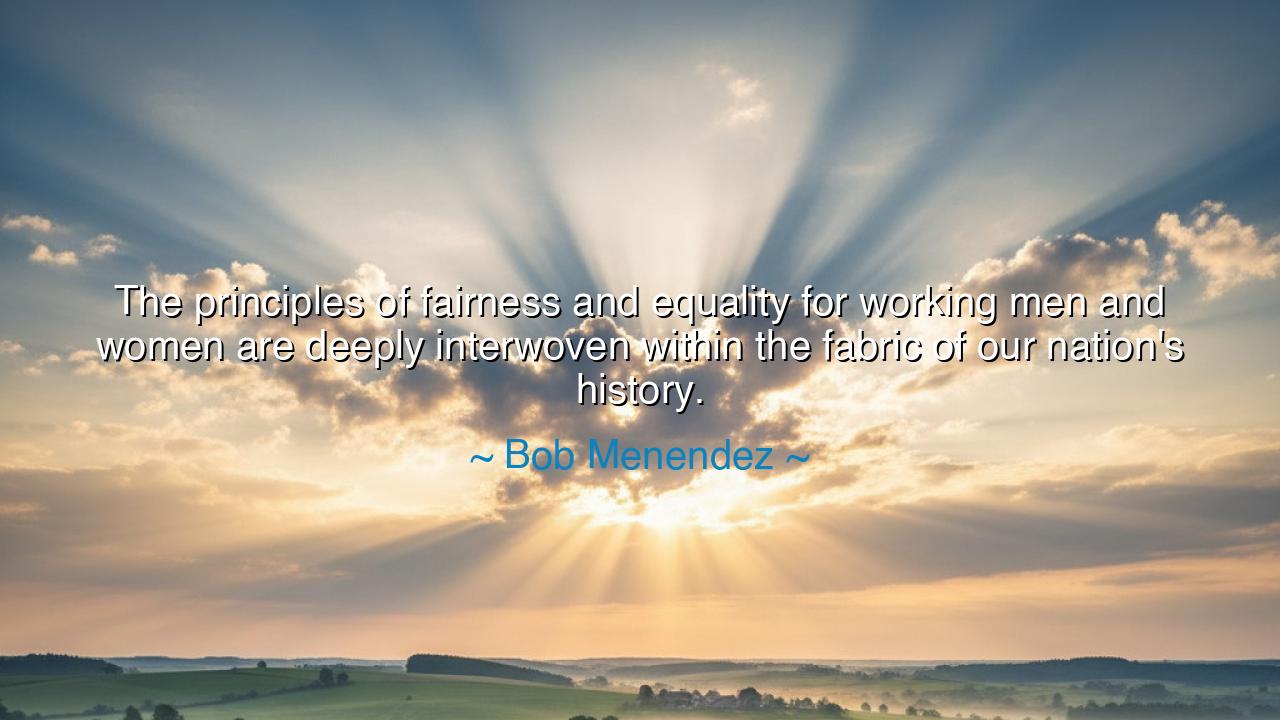
The principles of fairness and equality for working men and women
The principles of fairness and equality for working men and women are deeply interwoven within the fabric of our nation's history.






"The principles of fairness and equality for working men and women are deeply interwoven within the fabric of our nation's history." These words, spoken by Bob Menendez, speak to the very soul of a society built on the ideals of justice, fairness, and the dignity of labor. The history of a nation is not merely written in laws or documents; it is written in the lives of its people, in their struggles, their triumphs, and their relentless fight for equality. These principles, he reminds us, are not new or fleeting but are woven deeply into the very foundation of our society, calling us to honor them, to protect them, and to continue striving for their full realization.
In the ancient world, fairness and equality were often ideals proclaimed but not always practiced. In the Roman Empire, for instance, slavery was a cornerstone of economic prosperity, and working men and women were often treated as property, their labor taken without compensation or respect. Yet even in the shadows of such inequality, the voices of those who sought justice began to rise. Cicero, the Roman philosopher, spoke of natural law, the idea that all people have inherent rights to dignity and equality, regardless of their station in life. His teachings laid the groundwork for future generations to understand that the value of a society lies not in the riches of the few but in the justice afforded to the many.
As time passed, the fight for fairness and equality became a central theme in the development of modern nations, including the United States. The nation’s birth was rooted in the rejection of tyrannical power, and the founding fathers, though imperfect in their own actions, understood that a true republic must recognize the rights and equality of its citizens. The Declaration of Independence itself proclaims that all men are created equal—an ideal that was gradually extended to more and more groups through struggles for civil rights, women’s suffrage, and labor rights.
Consider the labor movement of the 19th century, which embodies Bob Menendez’s words about the principles of fairness and equality. In the industrial revolution, working men and women were often subjected to grueling hours, low wages, and unsafe working conditions. But it was in this very period that workers began to demand their rights, forming unions and striking for fair wages, better conditions, and reasonable working hours. The Haymarket Affair of 1886 in Chicago, where peaceful labor demonstrators were met with violence, became a pivotal moment in the fight for workers' rights. Men and women—often immigrant laborers—stood in defiance, demanding dignity in their labor, their right to fairness, and a life of respect.
This movement was not without its challenges, and the struggle for equality was slow and painful. Yet, it was persistent, driven by the belief that all human beings deserve the right to work with dignity and receive fair compensation for their efforts. Over time, the labor movement succeeded in securing many of the rights and protections we now take for granted—things like the eight-hour workday, the right to organize, and minimum wage laws. These victories were not the result of charity but of the tireless work of millions of men and women who believed in the inherent equality of all people and demanded that their society reflect that truth.
What Bob Menendez speaks to in his words is a call to honor the struggles of those who came before us. The principles of fairness and equality are not just ideals to be admired from a distance—they are living principles, earned through the sacrifice and struggle of those who refused to accept a world where some were valued more than others. These principles are woven into the very fabric of our nation, and it is our duty to continue the work of those who fought for justice and equality, ensuring that the promise of a fair and just society is extended to all people, regardless of their station or status.
The lesson we must take away is this: the fight for equality is not an abstract battle but one that is deeply rooted in the history of our nation. It is a call to action, to continue the work that has been started and to ensure that we do not become complacent in the face of injustice. The principles of fairness and equality must be actively defended, not just in the laws but in the actions we take every day. We must not only be the beneficiaries of the labor rights and protections won by previous generations, but also champions of these ideals, ensuring that they continue to flourish for those who come after us.
So, future generations, let us honor the legacy of those who fought for fairness and equality. Let us not simply admire the principles of justice but live them, practice them, and defend them. Stand firm in your belief that all people are entitled to the fruits of their labor, that no one should be denied their dignity or their worth based on their social class, gender, or ethnicity. And as you do, remember that the struggle for equality is never truly over—it is a journey that requires our constant commitment, a journey that will lead us toward the kind of world where fairness is not the exception, but the rule.






AAdministratorAdministrator
Welcome, honored guests. Please leave a comment, we will respond soon